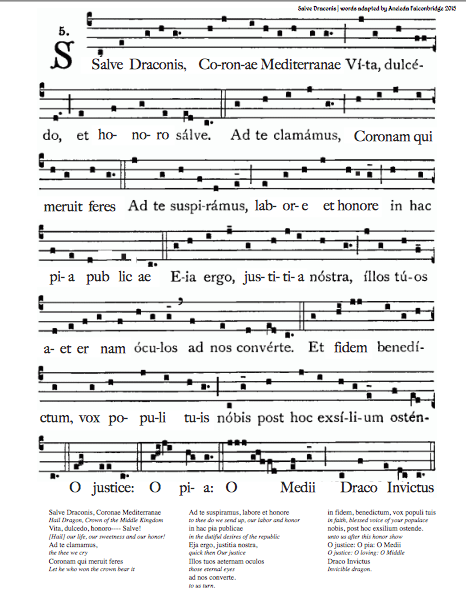I like it when children sing but recognize that it can be a challenge to find good “SCA” music to connect them to. This is why I love rounds! There’s lots of support and everyone can play together.
I was asked if I had suggestions for a class for bardic performance for children and I’ve done some spontaneous work with littles at events, and thought it would be fun to make a more organized class out of it. It’s a lot of what I’ve done “in the field” but with more structure.
Start with introductions and talk about music a bit in period. Ask questions like
What did people do for fun?
When might people make music?
What kinds of instruments were available?
What was ALWAYS available?
Talk a bit about how we make music now.
How is it different?
When do we sing?
Where do we see and hear performances?
What kinds of things do we sing about?
Medieval people sang about a lot of things. They sang about God and saints and about people they knew. Music was important because it was available to everyone.
Sing common children’s rounds to get warmed up and comfortable. Do them in this order if possible.
Twinkle Twinkle Little Star
Alphabet Song (does this song sound kind of the same as the last song?)
Row Row Row Your Boat (unison, then try it as a round)
Questions for these songs:
Which song is a story? What is the story about? Songs often told stories about people, places, and events. We call that “narrative” when something is telling us a story.
Which song is a lesson? What is it teaching us? Songs were used to teach people things sometimes, especially religion and some stories, because songs are easier to remember and also not everyone knew how to read words.
Which songs sound the same? Twinkle Twinkle and the ABC song use the same tune more or less. We call it “contrafact” and in medieval times, like now, many people used the same music to sing different songs.
Some songs changed, some stayed the same!
Three Blind Mice (Thomas Ravenscroft, 1609) comparison is good here. Start with the modern one, then teach the original one.
https://mbouchard.com/aneleda/three-blind-mice-then-and-now
People sang songs that were about other people!
Lady Come Down (Thomas Ravenscroft, 1609):
http://www.pbm.com/~lindahl/ravenscroft/pammelia/pam_36small.html
Lady come down and see the cat sits in the plum tree!
Oh My Love (Thomas Ravenscroft, 1609):
http://www.pbm.com/~lindahl/ravenscroft/songbook/oh_my_loue.html or
http://www.pbm.com/~lindahl/ravenscroft/deuteromelia/deut_37small.html
Oh my love, love thou me? Then quick come and save him that dies for thee!
People sang songs about their problems:
This is an Elizabethan song about complaining, My Goose.
My Goose (trad. probably in SCA period):
http://kodalysongweb.net/sites/default/files/Goose%20Round.pdf
“Why shouldn’t my goose sing as well as thy goose when I paid for my goose twice as much as thine??”
Hey Ho Nobody at Home (Thomas Ravenscroft, 1609):
http://www-personal.umich.edu/~msmiller/rheyhonobody.html
Hey ho nobody home, meat nor drink nor money have I none, yet I will be merry, very merry!
People even sang to sell things!
Songs were some of the first advertisements and music is still used to sell things! Listen to the radio and TV and you’ll hear how that works!
Hot Mutton Pies (Thomas Ravenscroft, 1609): The group can be divided into three sellers for this street call. Or they can learn the whole song. It’s a fun round. They could make up their own products if they catch on fast.
http://www-personal.umich.edu/~msmiller/rcatch52.html
Hot mutton pies hot, buy my dainty young beans, my young beans, crabs crabs any crabs?
People sang in Latin, and other languages.
Viva La Musica (Michael Praetorius, 1571-1621): Long live music!
http://www-personal.umich.edu/~msmiller/rvivamusica.html
Dona Nobis Pacem (credited to Giovanni Palestrina, 1525-1594): Give us peace.
http://www-personal.umich.edu/~msmiller/donanobis.html
(Do one part at a time, and if you can work a round out of it, it’s good. This is a good ending song too since many people of all ages know it and may join in if invited.)
Other pieces which are good choices for children include:
The Great Bells of Oseney (Thomas Ravenscroft, 1609): It sounds like bells ringing
http://www-personal.umich.edu/~msmiller/rdeut9.html
Go to Joan Glover (Thomas Ravenscroft, 1609): A sweet song about passing notes via song, really.
http://www-personal.umich.edu/~msmiller/rjoanglover.html
Joan Come Kiss Me Now (Thomas Ravenscroft, 1609): This is short and sweet, but has a tricky accidental. Fun to have people sub out other people’s names.
http://www-personal.umich.edu/~msmiller/rjoankiss.html
Any of the Three Country Dances in One – Particulary good is the Tenor Robin Hood.
http://www.pbm.com/~lindahl/ravenscroft/pammelia/pam_37small.html
Encourage your attendees to teach someone the songs they learned and perform them at the bardic circles at the event.
I have had success bringing the group out into someplace where “the public” can see them and having them perform “in concert” one of the pieces the did better at. It’s always been a big success and everyone has felt good about it at the end. A very positive way to end the session.

